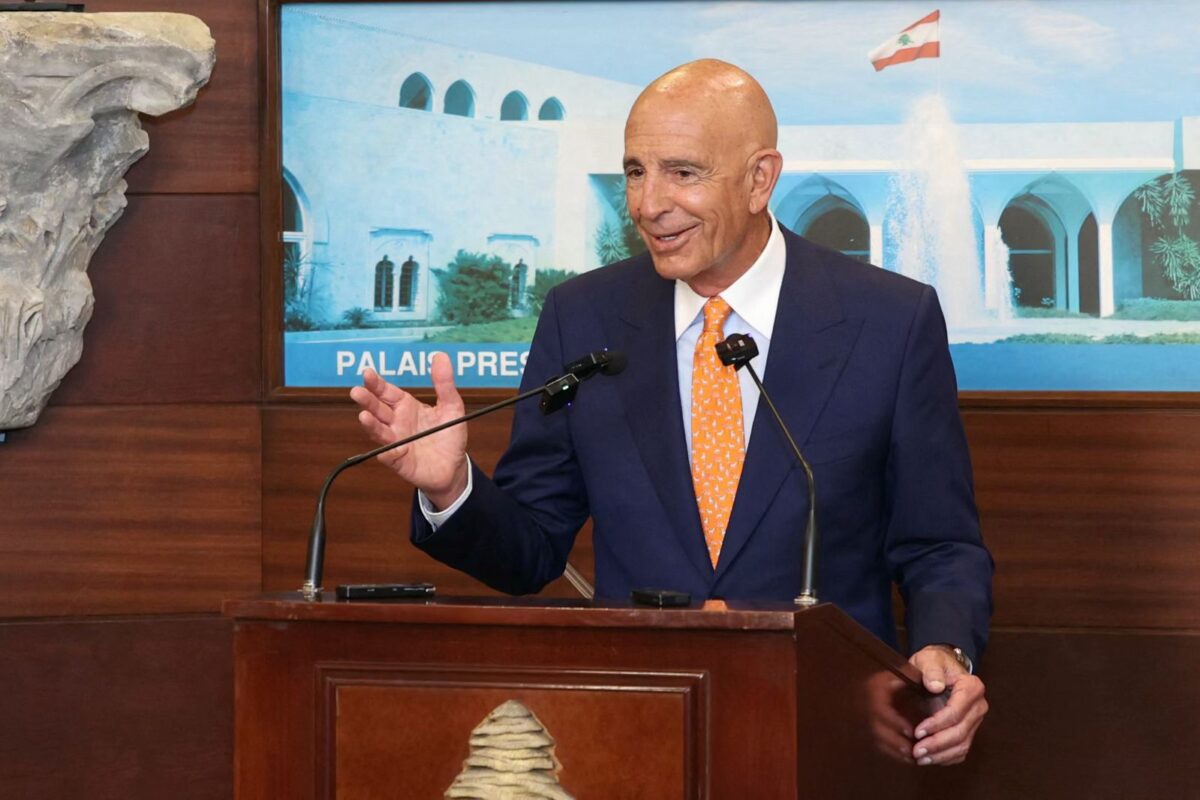
With the arrival of U.S. envoy Tom Barrack and a new proposal on the table, Lebanon faces a fragile diplomatic opening amid unresolved internal divisions and growing regional pressure
U.S. special envoy Tom Barrack concluded a high-level visit to Beirut this week, describing the Lebanese government’s official response to a recent American proposal as “spectacular” and “unbelievably satisfying.” The proposal, submitted to Lebanon on June 19, addresses the ongoing situation along the southern border and calls for measures tied to the implementation of last year’s ceasefire agreement with Israel.
While Barrack declined to disclose details, the U.S. proposal is widely understood to touch on security arrangements in the South, including the status of armed groups and the application of UN Security Council Resolution 1701. The resolution calls for the area south of the Litani River to be free of unauthorized weapons, but its enforcement has remained a point of contention since the 2006 war.
Lebanon’s response was formally delivered by President Joseph Aoun, with Prime Minister Nawaf Salam and Speaker Nabih Berri present. Although the reply was not the result of a full cabinet session, it was presented as a unified state position. Barrack welcomed the speed and seriousness of the response, noting the absence of leaks, which he framed as a sign of political maturity and confidentiality.
In a televised interview, Barrack emphasized that the U.S. role is not to dictate terms but to facilitate dialogue and support a stable resolution. He also stressed that Washington has no interest in intervening in Lebanon’s internal politics, and that any support offered would depend on Lebanon’s willingness to engage with regional and international expectations.
A central element in the discussions remains Hezbollah’s position as both a political party and an armed group. While the U.S. continues to designate Hezbollah as a terrorist organization, the group holds significant representation in the Lebanese parliament and government. The differing views between local and international actors on how to approach this issue continue to complicate diplomatic efforts.
Sources familiar with the proposal say that the language was intentionally flexible, allowing space for negotiation. However, interpretations vary: some see it as a call for full disarmament, while others view it as a step toward de-escalation rather than dismantlement.
Barrack warned against delays, suggesting that the window for progress may not remain open indefinitely. He pointed to shifting regional dynamics and said that Lebanon had a choice to make about whether to move forward or risk further isolation.
While the meeting marked a rare instance of high-level engagement, the path ahead remains uncertain. With multiple interpretations of both the proposal and Lebanon’s reply, the political process appears to be entering a cautious and complex phase, with broader implications for security, sovereignty, and international support.
Continuous aggression
Lebanese Prime Minister Nawaf Salam announced that discussions are underway with U.S. envoy Tom Barrack on a potential framework linking Israel’s withdrawal from Lebanese territory to addressing Hezbollah’s arms.
Speaking after meeting Barrack in Beirut, Salam reiterated that limiting weapons to the state has been part of Lebanon’s national consensus since the 1989 Taif Agreement. He also noted that Hezbollah, while armed, is part of the Lebanese state through its representation in Parliament.
Salam condemned ongoing Israeli airstrikes in the south and Bekaa Valley, calling them violations of the 2006 UN ceasefire (Resolution 1701), and said Lebanon is seeking international support to halt them.
He confirmed that President Joseph Aoun handed Barrack Lebanon’s official response to the U.S. proposal. In return, Barrack submitted a proposal reportedly focusing on disarmament, economic reforms, border control, and a framework for ties with Syria.
Despite a ceasefire reached last November, Israel has continued operations in southern Lebanon. Lebanese officials report nearly 3,000 violations, including over 230 deaths, and note that Israeli forces still occupy five border outposts.
While the exchange of proposals signals ongoing diplomatic engagement, it remains unclear whether a concrete agreement can be reached. With tensions still high on the border and political divisions unresolved, the path forward will depend on both internal consensus and regional developments.
Now what?
Military expert and US Army Colonel (ret) Abbas Dahouk describes Lebanon’s official response to the U.S. proposal as “diplomatically balanced yet cautious.” While it reiterates Lebanon’s commitment to Resolution 1701 and the role of the Lebanese Army, all issues regarding Hezbollah’s military status are likely to leave U.S. officials dissatisfied.
Domestically, the response avoids triggering internal tensions by not addressing disarmament directly. “Hezbollah’s role remains deeply divisive,” Dahouk told NOW.
Hezbollah is expected to publicly support Lebanon’s emphasis on national sovereignty and demand Israeli withdrawal, while quietly resisting any measures that might constrain its strategic freedom.
On the regional front, Gulf states are likely to remain cautious, tying future support to reforms and a diminished military role for Hezbollah. France and Qatar, Dahouk suggests, could expand their mediating roles to prevent further escalation, while Israel will likely continue pushing for the dismantling of Hezbollah’s military infrastructure.
Without meaningful reform, Lebanon also risks prolonged economic stagnation. “IMF and donor funds will likely remain frozen,” Dahouk warns, “further destabilizing Lebanon’s economy and increasing reliance on informal or politically motivated aid.”
Looking ahead, he expects Lebanon to continue its delicate balancing act—maintaining ties with Western partners while avoiding internal political rupture. Ultimately, Dahouk emphasizes, long-term stability depends on national cohesion: “Lebanon must first unite its people around a shared vision for the future. Expecting the military to disarm Hezbollah or protect Lebanon from external threats without this unity is both unrealistic and unfair.”
As Lebanon navigates renewed diplomatic engagement with the United States and mounting pressure to implement security and political reforms, its leadership remains caught between external expectations and internal constraints. The official response to the U.S. proposal reflects a strategy of cautious diplomacy—one aimed at preserving stability while buying time.
But with Israeli military aggression continuing, international aid largely frozen, and regional actors watching closely, that strategy may soon reach its limits.








